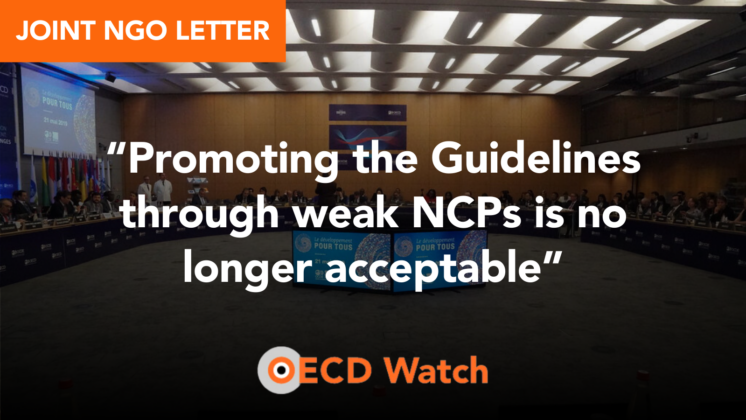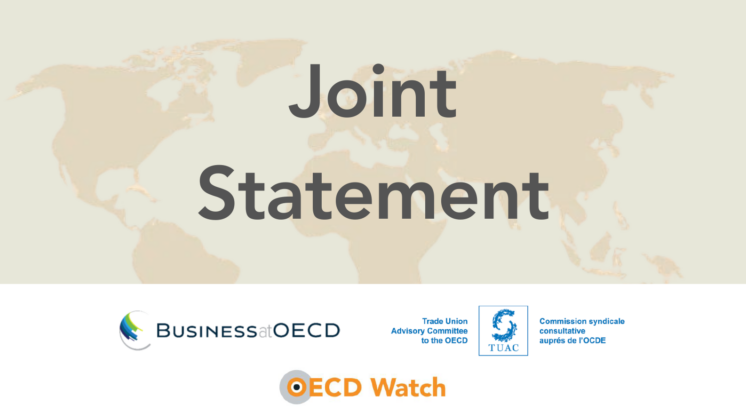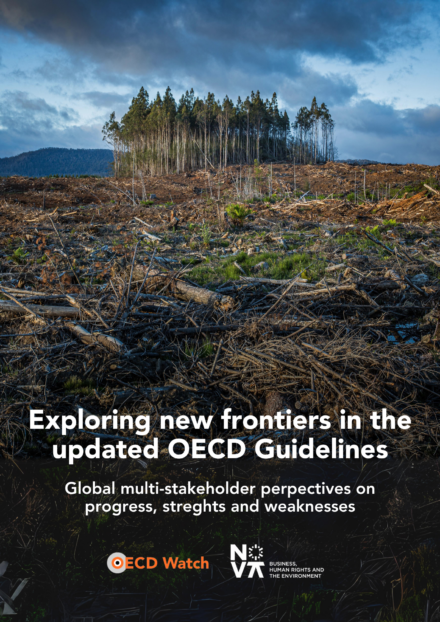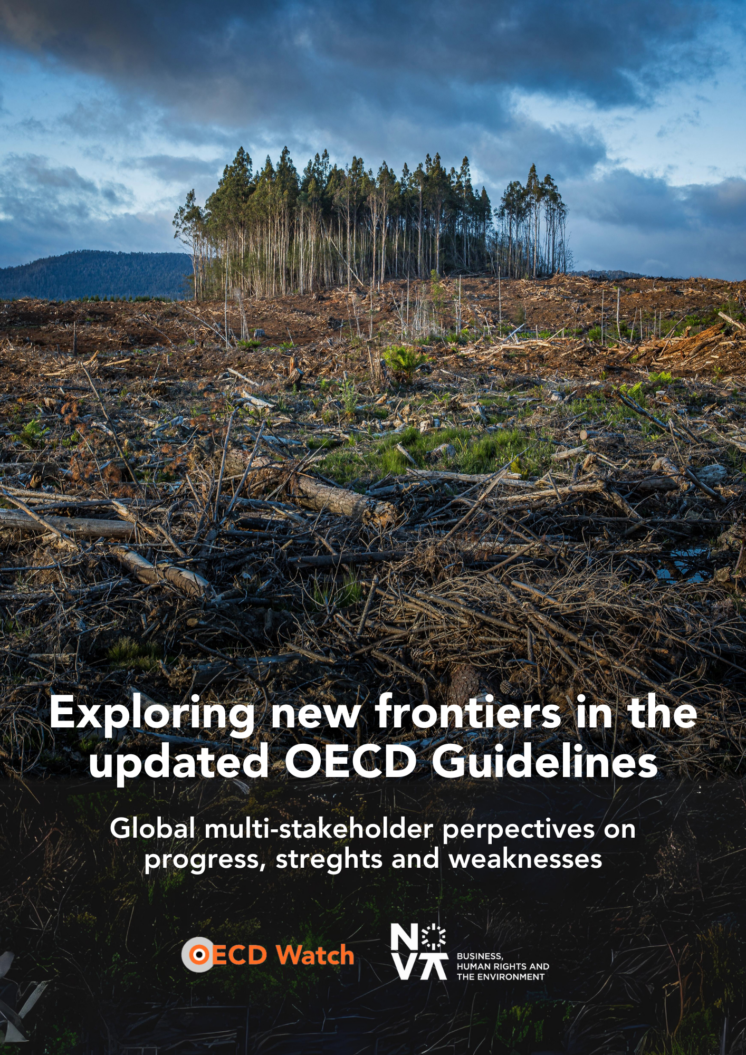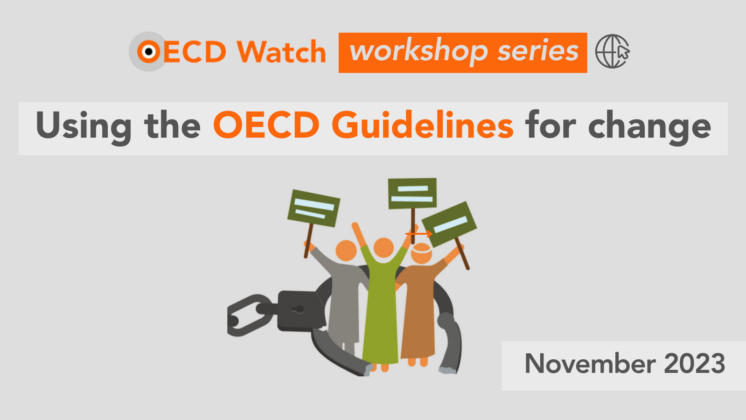National Contact Points have the unique potential to support access to remedy for business-related harms, but most aren’t meeting it. OECD Watch is demanding more – and sharpening our tool to measure achievement.

Since 2019, OECD Watch has assessed the performance of National Contact Points for Responsible Business Conduct (NCPs) – government-backed offices that promote the OECD Guidelines for Multinational Enterprises on Responsible Business Conduct (Guidelines). Following the 2023 update of the Guidelines, governments have set new and higher recommendations for NCPs to promote access to remedy and guide business conduct. OECD Watch is revamping our ‘key performance indicators’ to sharpen our own assessment of NCPs’ accessibility, accountability, and stakeholder engagement.
Weak performance of NCPs
As a non-judicial state-backed complaints mechanism, NCPs hold a unique position in the corporate justice ecosystem with potentially powerful impact in facilitating access to remedy and promoting better business conduct.
However, in practice, NCPs’ effectiveness varies significantly, with many failing to meet the basic requirements of either a promotional or complaints mechanism. The OECD itself has highlighted the various challenges and gaps in NCP performance, many of which are covered by our own analysis.
According to the United Nations Guiding Principles on Business and Human Rights, for a complaints mechanism to serve its purpose, communities impacted by corporate harms must know about it, trust it, and be able to use it. The failure of many NCPs to meet such expectations and the ‘core effectiveness criteria’ for NCPs in the Guidelines undermines the credibility of the whole system.
How is OECD Watch responding? First and foremost, by helping push for corporate accountability under law, using the Guidelines’ standards as a baseline. But also by strengthening our advocacy and tightening our assessment of NCP performance.
New government expectations for NCPs
Recognising the shortcomings in the broader NCP system, in 2023, the 51 governments that follow the Guidelines set new expectations and recommendations to strengthen NCP performance. Following over two years of advocacy by OECD Watch and hundreds of civil society and Indigenous organisations, the Guidelines’ Procedures now require NCPs to have the senior leadership, staffing, and budget necessary to fulfil their dual mandate to promote the Guidelines and help resolve disputes. Importantly, NCPs are also now called to use their own and external expertise to play a guiding role in complaints, supporting agreements that centre on commitment by the company to implement the Guidelines in future and address past harms where applicable.
Update of OECD Watch’s NCP evaluation project
Since 2019, OECD Watch has evaluated each NCP against a set of key performance indicators assessing NCPs’ complaint handling procedures, organisational structure and capacity, and communication and promotional activities. The project has led to several positive changes in how NCPs operate, documenting increased commitment to follow-up on agreements reached and recommendations given, improvements to complaint procedures, and greater involvement of non-governmental stakeholders in the complaint process.
We have updated our indicators to reflect the updated expectations in the Guidelines and lessons learned from the first five years of evaluations. The update was done in consultation with our network members, union partners, the OECD’s Working Party on Responsible Business Conduct (WPRBC) Secretariat, and NCPs. We are merging, deleting, and adding several new indicators to focus more sharply on what matters: accessibility, accountability, and stakeholder engagement.
Accessibility
Accessibility is a core effectiveness criterion for NCPs, but many are not accessible to impacted rightsholders. Complaints mechanisms can only be considered accessible if intimidation and reprisals against complainants are properly prevented and addressed—a fact that has now been highlighted in the updated Procedures.
We are calling on NCPs to adopt zero-tolerance policies and take proactive steps to prevent and address retaliation against both complaint parties and the NCP itself.
These policies should include measures such as proactively asking complainants about reprisal risks and, in consultation with those impacted, taking steps to assess, address, and implement measures to prevent or respond to reprisals. Further guidance on reprisals against human rights defenders in the NCP system can be found in our factsheet.
There are many other things NCPs should be doing to ensure the mechanism is accessible and our indicators reflect several of these.
- We evaluate whether NCPs offer guidance to communities on complaint filing, such as by providing a complaint template, step-by-step instructions, or pre-filing consultation. This helps to rectify power imbalances between complainants and well-resourced companies.
- We measure how far NCPs go to meet the language needs of impacted communities and if they hold mediation in a place or manner accessible to communities.
- We hold NCPs to assessing all and only the six ‘admissibility criteria’ specified in the Guidelines to determine whether a complaint should be accepted. Instances where NCPs have introduced additional criteria – such as requiring the harms to have happened in a specified period of time or requiring complainants to exhaust other remedy avenues first – undermine the integrity of the mechanism.
Accountability
Accountability is another core effectiveness criterion for NCPs, but many in civil society lack confidence in most NCPs’ ability to uphold the standards in the Guidelines or remain impartial. The updated Procedures underscore the importance of NCPs ensuring they have expertise on the content and implementation of the Guidelines and due diligence guidance and are using this to help guide complaints.
We are calling on NCPs to commit to using their expertise to guide the mediation of complaints and ensure any agreements reached are compatible with the Guidelines.
We also continue to push for additional things in our indicators that support the accountability of NCPs playing an expert role in complaints.
- We evaluate NCPs’ willingness to uphold the Guidelines by stating clearly when company conduct appears not to have met the Guidelines standards, through determinations, and by providing specific recommendations for improvement. This provides an authoritative stance on the issues and encourages companies to rectify past harms and improve future conduct.
- We measure whether NCPs will assess the claims raised even if the company refuses to engage. Proceeding with such an investigation prevents companies from unilaterally shutting down the process.
A new indicator also focuses on an important new expectation for NCPs: to support their government in developing, implementing, and fostering policies, programmes, and/or laws on responsible business conduct (RBC) that are coherent with the Guidelines. Like civil society, the OECD is also working to advance Guidelines-coherent binding law on RBC and NCPs are now encouraged to do their part.
Stakeholder engagement
Stakeholder engagement is a critical element for companies in their RBC due diligence and equally vital for NCPs. The Guidelines now require NCPs to maintain meaningful relations with all stakeholder groups, and our indicators reflect some of the key ways they can do this.
We are calling on NCPs to ensure that stakeholders, including civil society, are formally involved in their decision-making on complaints.
Based on OECD Watch’s extensive analysis of NCP cases, handling of complaints by non-governmental independent experts typically results in stronger outcomes and generates greater confidence among civil society in the mechanism. This is why we have a dedicated indicator identifying NCPs with this structure.
Our indicators also reflect some of the other ways in which NCPs can meaningfully engage stakeholders through their formal structure.
- We identify whether NCPs have a quadripartite structure comprising equal staffing from the government and the three core stakeholder groups (NGOs, labour unions/workers organisations, and businesses).
- We measure whether NCPs have an active stakeholder advisory body that includes all three stakeholder groups and whether they are involved in complaint handling.
Beyond their formal structures, our indicators assess key ways in which NCPs can build relationships and awareness among civil society.
- We identify whether NCPs have access to and, where relevant, use broad external subject-matter expertise from the government, civil society, or the OECD WPRBC Secretariat to support its complaint-handling functions.
- We assess how well NCPs promote the Guidelines and complaints mechanism to civil society specifically and to their government.
Next steps
While the updated Guidelines provide stronger standards and recommendations, their effectiveness relies on proper implementation by NCPs. Starting now, OECD Watch will evaluate each NCP using the revised set of indicators. This process will include consultations with NCPs, the OECD, and civil society involved with NCP activities in their country.
Over the next few months, we will explore the details of each indicator across our social media, explaining why they are important and how they might be relevant to potential complainants. Make sure you are following us on X and LinkedIn, and sign up for our newsletter, so that you can participate in the discussion, share experiences, and join our shared advocacy efforts on these topics!
In addition, if you’re interested in learning more about the OECD Guidelines and complaints, then check out our:
- Updated web pages detailing everything you need to know about filing complaints
- Upcoming webinars about NCPs and filing complaints happening across various timezones (more information on this will follow)
See the full list of revised indicators here and our methodology for evaluating NCPs here.





